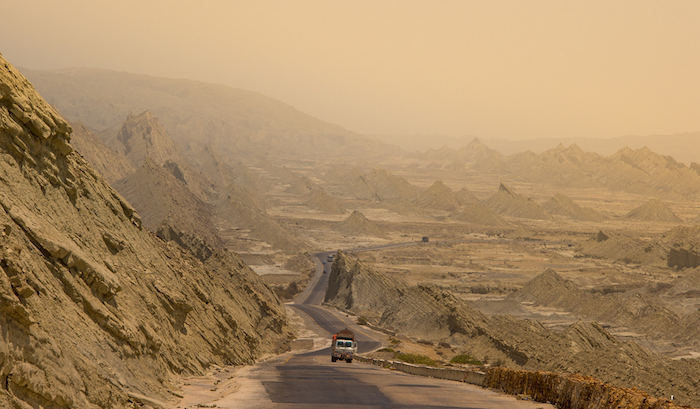Once a month here on the Molten Sulfur Blog, I run content taken from our book Archive: Historical People, Places, and Events for RPGs. This post is one of eighty entries in Archive, each more gameable than the last!

Balochistan
Land of Remote Villages
Balochistan is Pakistan’s westernmost province, and its largest and most sparsely inhabited region. It is a land of stony desert and sharp mountains. As many as ten different ranges ripple up in the highlands of Balochistan, though in the western part of the province, there are vast plains covered in black gravel and sand dunes. The inhabited pockets are separated by deserts and mountain ranges. Thanks to the long distances and poor infrastructure, outsiders usually only see the capital city of Quetta.
Quetta rests in a region of long valleys. The climate is dry and temperate, allowing for valley cultivation of grapes, peaches, plums, apricots, apples, almonds, pears, and pomegranates. Wheat, barley, and corn are common crops, as are juniper and pistachio forests. Horse breeding is widespread, as the animals are useful for travel across difficult terrain. In Quetta, you get a glimpse of the people who inhabit the forbidding province. A blend of Baloch, Brahvi and Pashtun tribesmen with thick beards draped over their faces and turbans bound atop their heads rub shoulders with women dressed in billowing burkas in the Quetta bazaars. Some Afghan refugees also linger. The bazaars feature felts, rugs, silk embroidery, and copper vessels, often handmade.
Beyond the dusty capital, travel becomes more difficult. A northern mountain range separates it from Afghanistan, and the district is hugged by other mountain ranges to the south and east. There is the Khojak Pass in one of the southern ranges and a railway tunnel piercing 2.5 miles of solid rock, but perhaps for smoother travel, the best way to go is southwest or west, where sandy desert stretches across districts. Rainfall is scarce, but two chief rivers cut through the arid desert. In places, swamps consume the areas where water does flow. If you do travel into the mountainous upper highlands, you can expect the area to be dry and extremely hot during the day and cold at night.
The people you come across in your travels are likely to be members of one of the three major ethnic groups of Balochistan: Baloch, Brahvi, and Pashtun. Each group is further subdivided into an array of tribes. The Baloch, believed to have originally come from Arabia or Asia Minor, have eighteen major tribes. The Baloch are likely best-known outside Pakistan for their rebellions against the Pakistani government. The Brahvis mostly concentrate in central Balochistan and are often grouped together with the Baloch. The origins of the Pashtun are unclear, but they mostly inhabit Afghanistan and the northern stretch of the Indus River. Despite Balochistan’s sparse population, most people in the cities and towns understand and speak more than two languages. In addition to the Balochi, Pashto, and Brahvi languages of the major groups, the majority of the population also speaks Urdu, the national language. In Quetta, people fluent in Dari and Farsi are also common.
Though people are divided ethnically and linguistically, they often show similarity in their literature, beliefs, moral order, and customs, with Sunni Islam being the cementing factor that provides a base for unity and common social order. All three of the major groups are known for their hospitality, holding guests in high esteem. Sometimes, a guest in one home is considered a guest of the whole village, and is treated as such. This attitude is usually only found among the tribes, not among the city or town dwellers.
Balochistan in Play
In a campaign, your PCs may need to travel through this empty province. Perhaps they have to deliver a message to someone in a remote village, the journey bringing them across different landscapes. Your PCs may use Quetta as their gateway to Balochistan, as the environment is more familiar to them. But when they travel deeper into the province, they may go days without seeing other people, and the people they do see participate in an unfamiliar culture whose mores the PCs cannot always predict. They may anger someone important along the way by an innocuous act, or be saved by another tribe’s tradition of hospitality. Baloch rebels mistrustful of outsiders might hinder the party’s progress. An ambitious chief could even be stirring up unrest between tribes and ethnic groups for her own ends, further complicating the journey.






